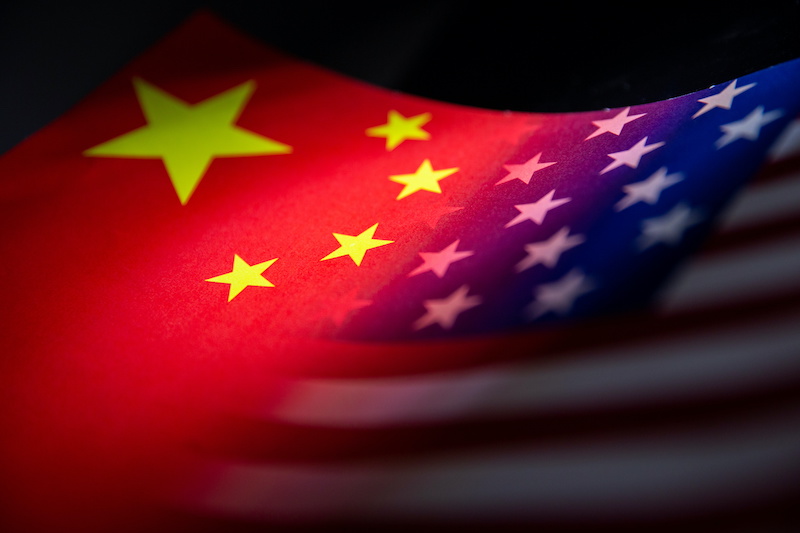The Biden Administration has widened its crackdown on China’s chip industry, adding 21 businesses in the artificial intelligence (AI) chip sector to its trade blacklist.
Memory chipmaker Yangtze Memory Technologies (YMTC) was also put on the list, because of fears it could divert American technology to Chinese tech giants Huawei Technologies and Hikvision, which have already been blaclisted.
The move, laid out in the Federal Register, will bar YMTC’s suppliers from shipping US goods to it without a difficult-to-obtain licence.
There are several different motives for these listings – they seek to curb China’s efforts to modernize its military and rights violations, plus crack down on key suppliers of components used in Iranian drones, and Russian-Belarusian military groups that supply the Russian military.
“Today we are building on the actions we took in October to protect US national security by severely restricting the People’s Republic Of China’s (PRC) ability to leverage artificial intelligence, advanced computing, and other powerful, commercially available technologies for military modernization and human rights abuses,” Under Secretary of Commerce for Industry and Security Alan Estevez explained.
The 21 Chinese AI chip entities added to the blacklist include Cambricon Technologies Corp and CETC, which face an even tougher penalty, with the US government effectively blocking their access to technology made anywhere in the world with US equipment.
Another notable name was PXW Semiconductor Manufactory Co, a startup chip fab is backed by the Shenzhen city government and led by an ex-Huawei executive.
As the Chinese government seeks to remove barriers between its military and civilian sectors, “US national security interests require that we act decisively to deny access to advanced technologies,” Assistant Secretary of Commerce for Export Administration Thea Kendler said in a statement.
ALSO SEE:
US to Ease Penalties on Some Firms Amid ‘Better’ China Behaviour
‘Economic Bullying’
The Chinese embassy in Washington said the United States was engaging in “blatant economic coercion and bullying in the field of technology,” undermining normal business activities between Chinese and American companies and threatening the stability of global supply chains.
“China will resolutely safeguard the lawful rights and interests of Chinese companies and institutions,” it added.
The move builds on sweeping export controls imposed on Beijing in October to slow Beijing’s technological and military advances, including measures to curb China’s access to US chipmaking tools and cut it off from certain chips made anywhere in the world with American equipment.
It also comes as Congress prepares to finalize legislation to bar the US government from buying products that contain semiconductors made by YMTC, Chinese memory chipmaker CXMT or China’s top chip manufacturer, SMIC.
YMTC, Cambricon, CETC and PXW did not immediately respond to requests for comment. Shares in Cambricon, which was spun out of the government think tank China Academy of Sciences in 2016 and went public four years later, fell 6% upon opening on Friday.
Nine of the targeted Chinese entities, such Shanghai Micro Electronics Equipment Group (SMEE), which is China’s only lithography company, support modernization of China’s military. SMEE did not immediately respond to a request for comment.
Chinese surveillance camera maker Tianjin Tiandi Weiye Technologies were included for allegedly participating in “China’s campaign of repression, mass arbitrary detention, and high-tech surveillance against Uyghurs.” Tiandi also did not respond to a request for comment.
All up, some 35 Chinese entities were added to the US trade blacklist, known as the Entity List, as well as YMTC’s Japan-based subsidiary.
Reprieve for Wuxi Biologics
Thursday’s announcements weren’t all bad news for Beijing. The Biden administration removed a subsidiary of Wuxi Biologics, a company that makes ingredients for AstraZeneca’s Covid vaccine, and 26 other Chinese entities from the so-called unverified list thanks to successful site visits.
Two of the Chinese companies removed from the unverified list – YMTC and SMEE – were added to the entity list. Wuxi did not respond to a request for comment.
Companies are added to the unverified list if the United States cannot complete on-site visits to determine whether they can be trusted to receive sensitive US technology exports, inspections, which in China require approval from the country’s Commerce Ministry.
Being added to the unverified list forces US suppliers to perform greater due diligence before shipping to the targeted companies.
Commerce Department officials have attributed greater cooperation from Beijing in site checks to a US rule announced in October. Under that rule, if a government prevents US officials from conducting site checks at companies on the unverified list, Washington may add them to the Entity List after 60 days.
Under that new policy, the Commerce Department on Thursday removed nine Russian entities from the unverified list and added them to the entity list because the United States has been unable to conduct site visits.
Top Senate Democrat Chuck Schumer heralded the new penalties on YMTC, which is under investigation for allegedly violating US export rules by supplying chips to Huawei without a licence.
“YMTC poses an immediate threat to our national security, so the Biden Administration needed to act swiftly to prevent YMTC from gaining even an inch of a military or economic advantage,” he said in a statement.
- Reuters with additional editing by Jim Pollard
ALSO SEE:
US Fears China Flooding Global Market With Older Chips
SoftBank’s Arm Cannot Sell Cutting-Edge Chip Designs to China
China Files Complaint Against US Microchip Curbs to WTO
China Seen Planning $143 Billion Push to Boost Local Chipmakers
























